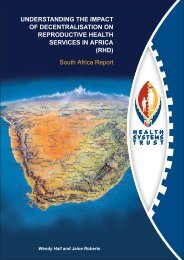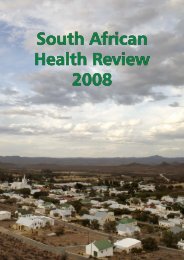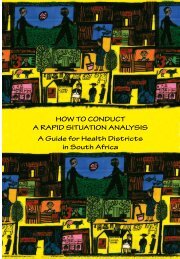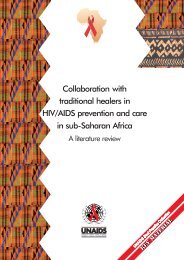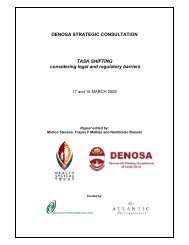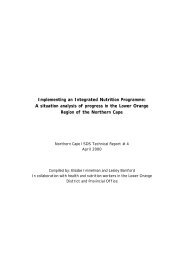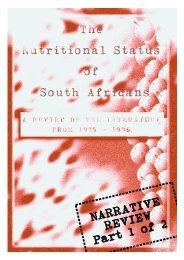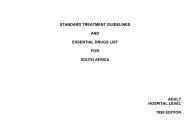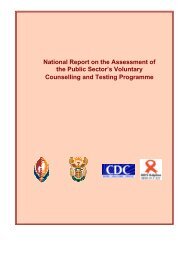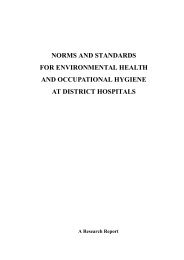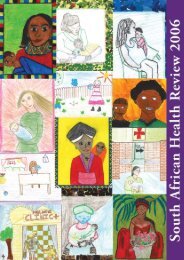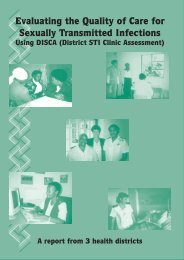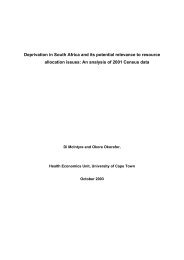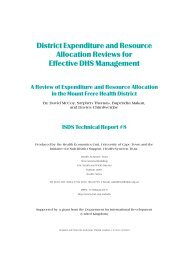SAHR 2007 - Health Systems Trust
SAHR 2007 - Health Systems Trust
SAHR 2007 - Health Systems Trust
Create successful ePaper yourself
Turn your PDF publications into a flip-book with our unique Google optimized e-Paper software.
The speech by the Minister of <strong>Health</strong> at the African Traditional<br />
Medicine Day in September <strong>2007</strong> highlighted the importance<br />
of the holistic inclusion of African Traditional Medicine<br />
in the national health system. 17 Initiatives that have been<br />
completed or are underway include:<br />
➤<br />
➤<br />
➤<br />
➤<br />
➤<br />
work on the policy framework on African Traditional<br />
Medicine by the Presidential Task Team;<br />
the prioritisation of registration and the regulatory<br />
framework for practitioners;<br />
work undertaken with the Medicine Regulatory Authority<br />
by the Ministerial Task Team to facilitate the registration<br />
and regulation of African Traditional Medicines;<br />
making funds available for research and development<br />
of medicines; and<br />
the establishment of a unit for TM within the DoH.<br />
The Minister further announced that consideration is being<br />
given to the establishment of an Institute for African Traditional<br />
Medicine for research and training.<br />
Traditional medicine practitioners in South<br />
Africa<br />
In 1999, Pretorius estimated that there were between<br />
150 000 to 200 000 traditional healers in South Africa,<br />
belonging to some 100 separate organisations. 3 This estimate<br />
was confirmed in <strong>2007</strong> by investigations conducted by<br />
the authors as indicated in Table 1.<br />
Table 1:<br />
Province<br />
Number of traditional healers in South<br />
Africa, <strong>2007</strong><br />
Number of practitioners<br />
EC 10 780<br />
FS 22 645<br />
GP 61 465<br />
KZN 14 941<br />
LP 7 366<br />
MP 57 524<br />
NC 2 221<br />
NW 5 935<br />
WC 2 600<br />
Total 185 477<br />
The KwaZulu-Natal DoH have developed a system to enumerate<br />
traditional healers in the province. Results indicate<br />
that there are approximately 25 000 traditional healers in<br />
KwaZulu-Natal (KZN). More than half of these are actually<br />
practising (14 941, see Table 1) and a further half (about<br />
7 000) is estimated to be registered with their interim professional<br />
body. This reveals that there is a possible under estimate<br />
of the actual numbers of traditional healers in South<br />
Africa.<br />
The Traditional <strong>Health</strong> Practitioners Act classifies traditional<br />
healers as:<br />
➤<br />
➤<br />
➤<br />
➤<br />
➤<br />
Diviners (Izangoma / Amagqirha)<br />
Herbalists (Izinyanga / amaxhwele)<br />
Prophets / faith healers (abaprofeti / abathandazeli)<br />
Traditional surgeons (iingcibi)<br />
Traditional birth attendants (ababelethisi / abazalisi)<br />
At this stage it is not possible to determine the number of<br />
healers in each category and an assessment will only be<br />
available once the Act has been implemented and formal<br />
registration of practitioners has occurred.<br />
Complementary and alternative<br />
medicine<br />
Policy and legislative framework<br />
The formal recognition of complementary and alternative<br />
medicine practitioners in South Africa has taken many<br />
years. 15 Chiropractors, herbalists, homeopaths, naturopaths<br />
and osteopaths were able to register during a six month<br />
period in 1974, following which the registers were closed.<br />
The Chiropractors, Homeopaths and Allied <strong>Health</strong> Service<br />
Professions Act (Act 63 of 1982) provided for the establishment<br />
of the South African Associated <strong>Health</strong> Service<br />
Professions Board. The registers for chiropractic and homeopathy<br />
were reopened in 1985. In the early 1990s, the<br />
Confederation of Complementary <strong>Health</strong> Associations<br />
of South Africa (COCHASA) lobbied for the recognition of<br />
complementary practitioners. However, apart from a window<br />
period to allow for the registration of aggrieved practitioners<br />
in 1996, the registers for phytotherapy, naturopathy and<br />
osteopathy remained closed.<br />
Source:<br />
Compiled based on research by authors.<br />
<br />
<br />
Personal communication, N Mtshali, KwaZulu-Natal Department of<br />
<strong>Health</strong>, May <strong>2007</strong>.<br />
The latter term does not reflect the scope of practice of traditional birth<br />
attendants. A more appropriate term might be traditional reproductive<br />
health attendants.<br />
178



